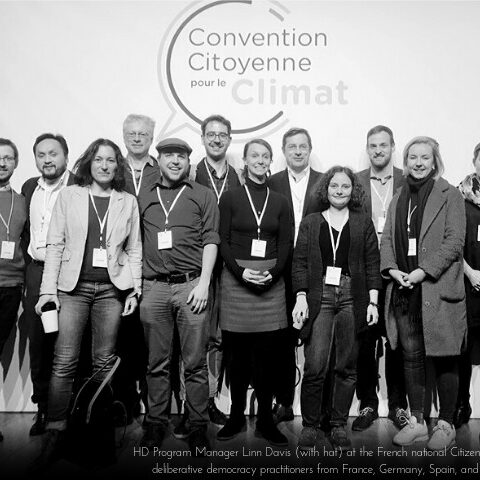It seems like ages ago and a different way of life. But it was only at the start of this month that I found myself back in Europe, observing another citizens’ assembly — this time in Paris to witness France’s national Convention Citoyenne pour le Climat.
No matter how you measure it, this is a big one: seven weekends of work, 150 citizens randomly selected from across France and its overseas territories, and a level of political gravitas that is off the charts.
Here we have a head of state personally convening a citizens’ assembly — and then giving it the power to back him into a political corner. President Macron has stated that proposals from the assembly will be enacted through executive order, sent to parliament for consideration, or sent to national referendum. Not necessarily all proposals, mind you; everything passes through the president, and some proposals may be dismissed out of hand. But Macron has set such an expectation of action, specifically of a national referendum, that using his veto power will come with political risk.
The whole situation is incredible and unprecedented. No other national citizens’ assembly in modern history has wielded this level of potential power.
The unique political significance, however, also puts the process — the design, the facilitators, the assembly members, everything — under unique political pressure. Even in the Citizens’ Initiative Review, we know that external political manipulation and internal unconscious bias are ever-present threats to the process. What’s more, we know that the more sensitive the political topic, the more likely — and the more visible — those threats become.
Nonetheless, it is unclear to me what the long-term effects of that pressure will be on the French assembly, and I’m not inclined to hazard a guess now. (Plus, there are 40-odd independent researchers observing the Convention who are infinitely more qualified than I to comment. Look for their reports later this year.) But this question of political pressure has caused me to think critically about how our processes are born, how they are organized, and how their integrity is ensured.
So I’d like to suggest some questions for us to consider, as a field. After all, we’re all sitting at home with our feet up and our thinking caps on, right? These are based partly on the French experience but also on my visits to four UK assemblies earlier this year, as well as on our work here in Oregon. Admittedly, many of these are questions with opinions attached, so question my assumptions, too, if you will.
That said, a few things I’m wrestling with:
- At a high level: How do citizens’ assemblies gain acceptance with public officials and the public at large? Specifically, what is driving the current wave of citizens’ assemblies across Europe? Is it primarily pressure from the streets — the protest movements of varying stripes demanding democratic reform? Is it pressure from the inside — the old-guard civic institutions that have come to see assemblies as their future? Is it better marketing — a well-known book, a much-viewed TED talk, and prominent assemblies in Ireland and Belgium? No doubt it is some combination of those and other factors. But what exactly are the ingredients and proportions of this primordial soup?
- Now into the weeds: How do we, as process designers, increase the involvement of participants in core decision-making functions within our processes — e.g., process design, stakeholder/expert selection, real-time process evaluation, dispute resolution — while still ensuring processes are time-efficient and broadly fair? It is, after all, the randomly selected assembly that carries the legitimacy in these processes — not the politicians, not the experts, not even us. That’s why we believe in lottery selection. So why isn’t the assembly more involved in directing its own process? And how do we design toward that goal?
- That question may help to answer this one: How do we design processes to inoculate them against manipulation and bias while a) not patronizingly “protecting” participants, b) not introducing further bias by capriciously restricting access to information, and c) not being authoritarian about our control over process?
- Relatedly, how do we overhaul our decision-making and oversight mechanisms, to address accountability concerns across our field? This is particularly key in high-level political environments — where the involvement of powerful stakeholders is both essential for political credibility and threatening to it. Even in low-stakes political spaces, however, we need to redesign the roles of steering committees, process ombuds, and independent monitors to provide more substantial and participant-led accountability. We need to build in better checks-and-balances and prioritize radical transparency. The big question is: what does that look like in practice?
- How do we better train facilitators for the unique needs of these events? Specifically, how do we train facilitators to a) maintain separation between content and process, b) value the “soft” people-skills that help folks feel comfortable and welcome, and c) treat participants as respected decision makers, not focus group subjects? Put a different way, how do we transition from the traditional facilitator-as-instructor and -consensus-finder, to the more democratic facilitator-as-wayfinder and -friendly-mediator? This is a difficult paradigm shift for many facilitators, I think, but it is crucial to achieving a larger goal: shifting the balance of in-room power to the citizens.
- Where do we find partners who are already doing all of the above better than we are?
If you have thoughts on these — or anything else — I’d love to hear them. Please drop me a line.
Finally, I just want to say thank you to our friends at Missions Publiques — particularly Yves, Antoine, Manon, and Huy — for their hospitality on this trip. In the midst of co-facilitating this complex event, they organized a two-day workshop for a dozen international visitors, arranged meetings with key officials and researchers, and made us feel very welcome at the Convention. This was an exceptional opportunity for practical shared-learning in our field, and a model for open-access peer observation. We look forward to blatantly copying the concept at one of our events soon!


